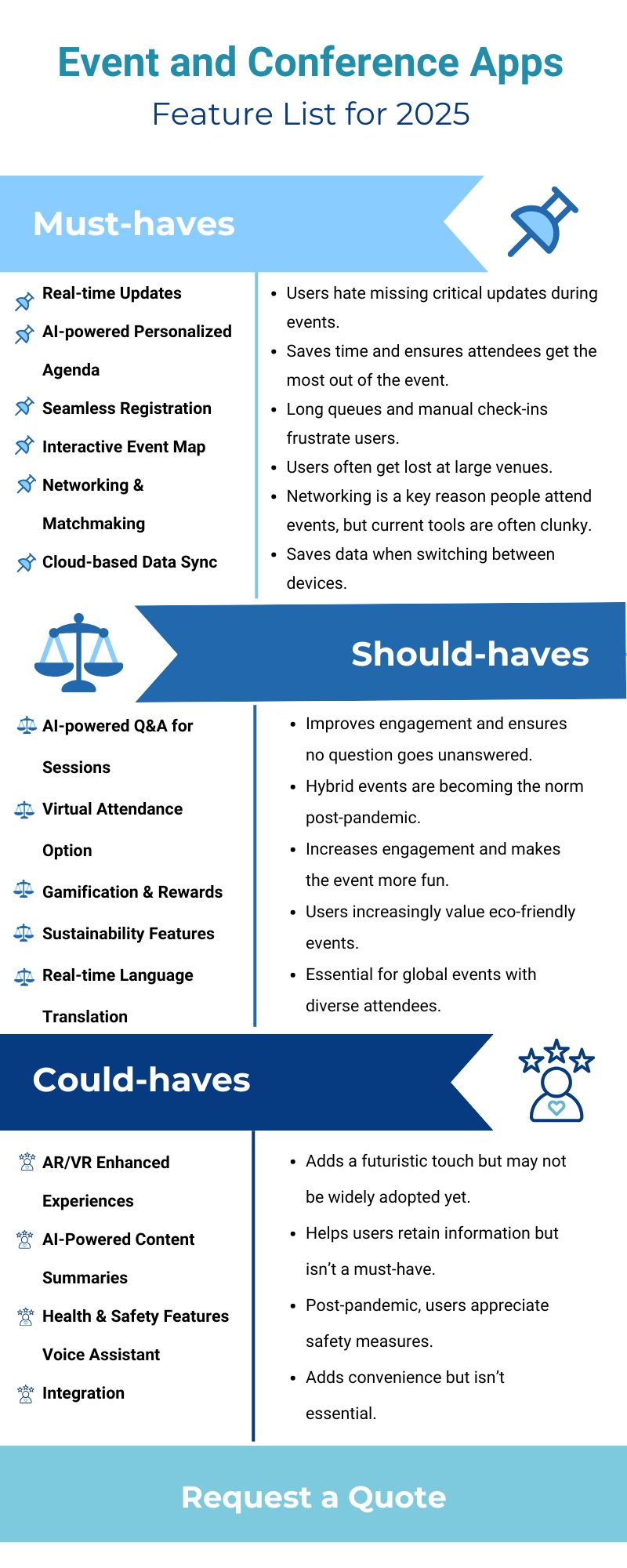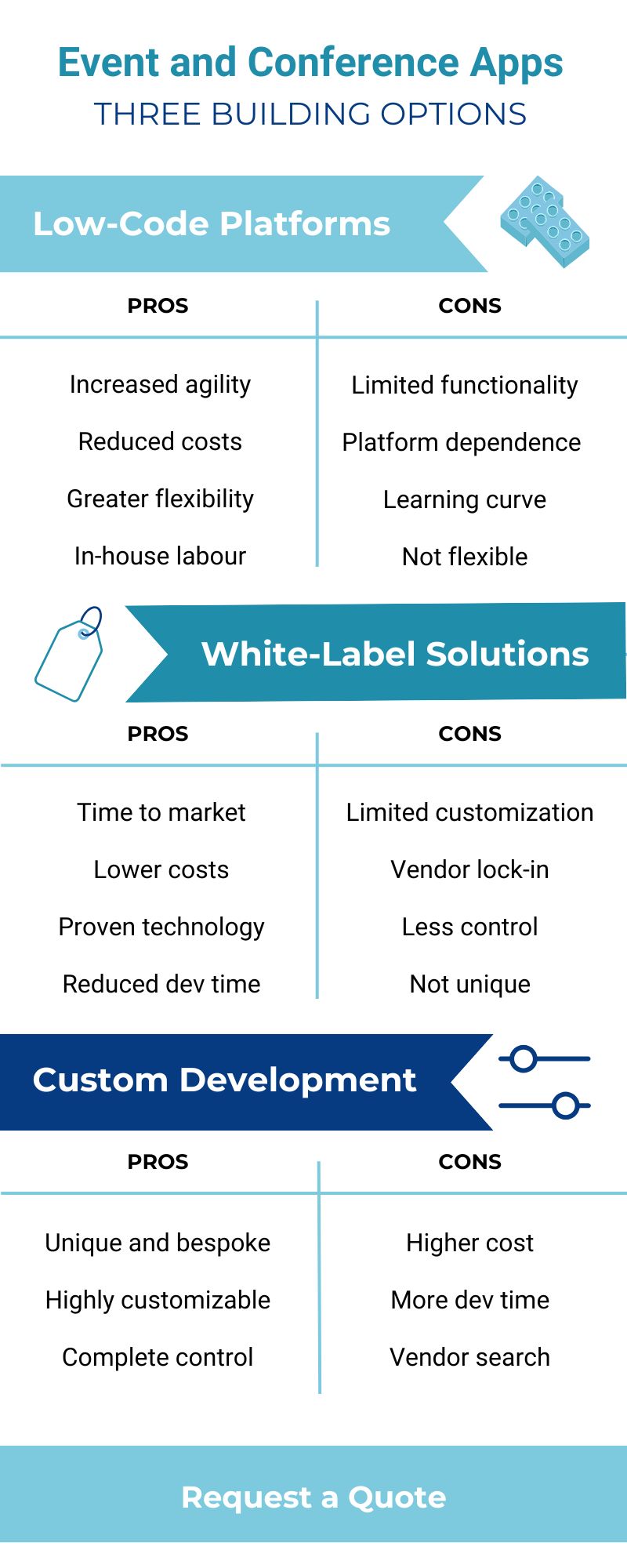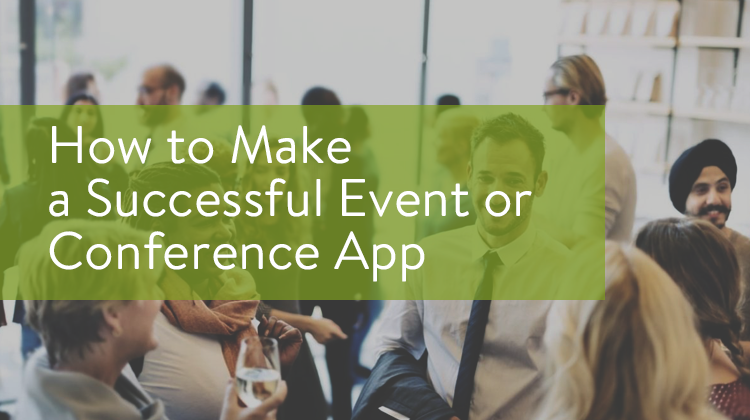Do you know what a lost attendee and a missed keynote presentation have in common? They both point to a poorly designed event app. According to the Bizzabo report, over two thirds of organizers ascribe the ultimate event success to the event software.
Event and conference apps are not just a contraption of the lockdown era. They are pretty much alive and booming today. And by the year 2028, the event industry market value is expected to exceed $2 trillion.
So here is a shortcut to building a successful event or conference app in 2025.*
*This is an update of the 2020 article due to the fast-evolving tech landscape.
The plan
What is an event app?
Whether you are planning a show, wedding, or online conference, an intuitive solution is always at the touch of a button. An event app is a mobile application designed to enhance the attendee experience at conferences, trade shows, and other social events. Think of it as your digital event guide, packed with information, tools, and features to maximize your experience.
Event apps landscape is diverse
Event and conference apps come in various sizes, shapes, and forms. From small dedicated apps to all-inclusive giants, and some provide hybrid environments and post-conference services as well.
- Dedicated apps. Many conference organizers create their own apps with just core features like schedules, speaker bios, maps, and event information.
- Networking apps like Bizzabo or Whova provide event management tools that help connect attendees. They have AI-powered matchmaking, group chats, and one-on-one messaging.
- Larger-scale all-in-one event platforms like Cvent and Hubilo offer a wide range of features, including registration, ticketing, live streaming, surveys, and lead capture.
- Virtual and hybrid event platforms like Hopin or Run The World are designed for online and hybrid events, offering features like live streaming, interactive sessions, and virtual networking.
Three reasons to build the next-gen event app
Counterintuitive as it may seem, you are not too late for building yet another conference app. In fact, it’s perfect timing as there is a demand for events and better apps. And AI tech is making advancements.
#1 Event industry boom
You would think it’d fade up since travel limitations are lifted, but no: a whooping 47.2% of event organizers reported growth of their events teams in the past year. We got too comfy with conference calls from the comfort of our rooms. It’s so painless to market our products to audiences worldwide on virtual events.Thus 14% of a marketing budget goes toward event marketing.
#2 Demand for better apps
Despite the comfort, conference technology is far from perfect – 67.4% of event planners report changing or planning to change their event software. Attendees want to get away from screens and seek real-life connection. They prefer greater immersion, meaningful communication, as well as more efficiency with planning and data retrieval.
#3 AI technology
AI and GPTs are going to change the game in event tech, driving investments. With AI personalization and data handling your business can get to a whole new level.
A step-by-step guide to building a successful event app in 2025
First up, here is the process overview, which is fairly universal for mobile app development.
- Define your app’s purpose and target audience. The app’s functionality directly correlates with its users. Understand who is your target audience and address their specific needs. Balance those with your business needs to get ROI. That will make the app’s core functionality.
- Choose the right development approach. How much code will you have to produce, where are you going to manage your app, how much control do you want to have? Whether to choose native, hybrid, or web app development? Determine your path to app development based on your business needs, time frame, and resources. Further on, we will detail on this subject.
- Prioritize user experience (UX). As the number of event apps continues to grow, user experience may be the major differentiator. After all, you can entice your users by fancy propositions, but only high quality service will make them stay. So make sure your mobile application is intuitive and high-performing, delivers personalized experience and accessibility.
- Key features and functionality. Once you know your users, understand their needs and your business goals, and have chosen the approach, you can translate it into the app’s functionality and estimate its business value. Start with basic features like registration, profiles, scheduling, search, maps & geolocation. Move on to more advanced ones like networking tools, live-streaming and on-demand content, gamification, data analytics, personalized recommendations etc. Further down, we will detail on what features to prioritise in 2025.
- Security and privacy. Besides user functionality, take care of user data protection and overall security. Implement robust security measures to protect user data. Use strong authentication methods and adhere to the relevant regulations like GDPR and CCPA.
- Testing and deployment. Follow up each iteration with rigorous testing and user acceptance testing. It’s also the time to consider deployment strategies (App Store, Play Store, or web-based).
Next, let’s dive deeper into some of these steps.
The ultimate feature list of an event app in 2025
Start by brainstorming and mapping the features that will make a winning conference app. It’s easy to get carried away by bells and whistles. But ultimately, you want your users happy and your money working. Therefore, prioritize your feature list based on your business goals, budget, and target audience.

Finally, let us short-list three features that will make your application really shine:
- Real-time updates. Nothing ever goes as planned in events. Timely updates on schedules, speaker changes, and venue modifications are essential to keep the participants happy.
- Networking. While conferences and events are all about networking, connecting and idea exchange, event apps in particular should facilitate networking on all shapes, forms, and sizes. That includes features like attendee profiles, messaging, and group chats.
- Post-event engagement. Apps can extend the event’s impact by providing post-event resources, surveys, and community forums.
And let’s not forget to sprinkle some AI magic!
How AI technology can transform the event industry
How does it feel to have a smart personal assistant, awake 24/7 and taking personalization, efficiency, and engagement to the next level?
Attending a major tech conference becomes a breeze. The event app sends real-time notifications if your favorite speaker’s session has been moved to a larger room – and gives the direction. No more arduous research of who to meet – use smart recommendations based on your personas. Later, during the keynote, you ask a question via the app, and the AI moderator ensures it’s answered, even in a room of thousands. Don’t you like smarter networking!
But it doesn’t end here. AI can provide virtual and hybrid support. From real-time translation to automated captioning, AI bridges the gap between in-person and virtual attendees.
Besides improving the attendee experience, AI helps organizers make smarter decisions. It provides valuable insights for future planning. You can make events more interactive and fun by creating personalized challenges and rewards. Or how about creating a memorable, futuristic experience through the use of AR to navigate the venue or interact with virtual booths? And ensure your application is sustainable with e-badges and paperless handouts.
By embracing AI, you’re not just hosting an event—you’re creating an unforgettable, tech-driven experience. The tools are here, and the possibilities are endless.
Сhoose a path for your event application development
These are the key options for building an event app:
- Custom development. This is like building a bespoke suit – tailored to your exact needs. It offers maximum flexibility but comes with a hefty price tag and longer development time.
- White-label solutions. Think of this as buying a well-designed car. You get a reliable and ready-to-go app with basic features, but customization options might be limited.
- Low-code platforms. This is like building with LEGOs. You have the freedom to create something unique, but you don’t need to be a construction expert. These platforms are user-friendly and often include AI features to streamline the process.
Each option comes with tradeoffs.

So, which option is right for you?
- Choose custom development if you need a truly unique app with highly specialized features and have the budget and time to invest.
- Consider a white-label solution if you need a quick and cost-effective solution with basic features and don’t require extensive customization.
- Explore low-code platforms if you want flexibility, want to empower your team, and value speed and cost-effectiveness.
By carefully considering your needs and budget, you can choose the best path to create a successful event app that meets your goals.
More on this topic: How to Choose a Mobile Development Platform – Startup Hacks
Conclusion
What makes a truly winning app is simplicity and intuitiveness. If you figured out how to combine effortless UX, powerful networking, data-driven insights, make it accessible and innovative, it’s the battle half won. Now bring it to the market!
What features would you like to see in your awesome event app? Share in the comments.
How much does it cost to build an event app with CodeTiburon?

